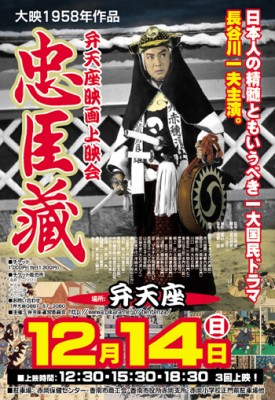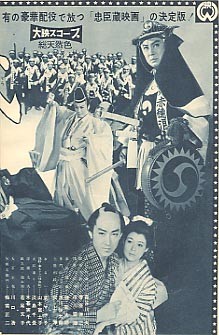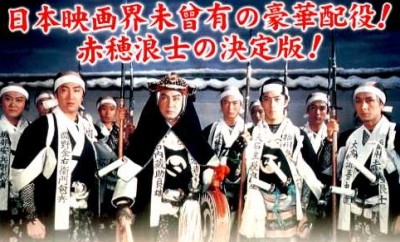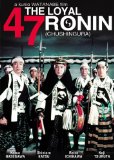| Reviews & Columns |
|
Reviews DVD TV on DVD Blu-ray 4K UHD International DVDs In Theaters Reviews by Studio Video Games Features Collector Series DVDs Easter Egg Database Interviews DVD Talk Radio Feature Articles Columns Anime Talk DVD Savant Horror DVDs The M.O.D. Squad Art House HD Talk Silent DVD
|
DVD Talk Forum |
|
|
| Resources |
|
DVD Price Search Customer Service #'s RCE Info Links |
|
Columns
|
|
|
Loyal 47 Ronin (Chushingura), The
Chushingura was also surefire box office and a means for each of the major Japanese movie studios to show off their resources. Chushingura movies were inevitably all-star, lavish productions, and usually "New Year" movies, released just as Japanese workers were leaving for their New Year's holiday, the biggest of the year.
When color and widescreen starting taking off in Japan in the late-1950s, it seemed like a good time for each of the major film companies to produce color and widescreen Chushinguras. Shochiku's 1957 film seems to have been first out of the gate; Daiei's version came next, in 1958, followed by Toei's adaptation the year after that. Toho, a studio best-known for their urban comedies, filmed the two-part Salaryman Chunshingura, a modern-day and comic take on the story, in 1960, but then pulled out all the stops for an epic jidai-geki directed by Hiroshi Inagaki in 1962.
AnimEigo's The Loyal 47 Ronin (Chushingura) is the 1958 Daiei film, which is a fairly conventional but typically compelling telling of the fact-based story. Overall, it's quite similar to Hiroshi Inagaki's 1962 film, with subtle differences reflecting the tastes and ambitions of each studio. The DVD looks quite nice, and the supplements are a big step up from the label's usual releases.
Japanese revival screening advertisement
Set at the turn of the 18th century, Chushingura begins with the story of Lord Asano (played here by Raizo Ichikawa), an incorruptible retainer who refuses to bribe greedy elder Lord Kira (Osamu Takizawa) - a court official whose advice he desperately needs. When Asano refuses to give in, Kira berates him mercilessly and relentlessly tries to humiliate him publicly, finally goading Asano into drawing his sword in the palace - a capital offense. The Shogun forces Asano to commit seppuku (inaccurately called hari-kari by most westerners) while the famously corrupt Kira walks away unpunished.
The loyal samurai of the Asano Clan are outraged; they want to avenge their unjustly punished master by taking Kira's head. However, Asano's chief retainer, Oishi (Kazuo Hasegawa) peacefully surrenders the estate and the samurai are disbanded without incident.
The crux of Chushingura's drama is the almost agonizing suspense over whether Oishi is really planning to avenge his late master. After nearly two years, Oishi has become something of a drunken rogue flaunting an affair with a harlot, Ukihashi (Michiyo Kogure), while his wife (Chikage Awashima) and family endure it in the proper Japanese manner. Relatives of other Asano samurai become impatient: Why aren't their sons and husbands avenging their lord? How can they go about their lives, doing nothing?
Of course, the big- and already widely-known payoff is that Oishi has been carefully plotting and planning all along, and in every movie Chushingura the tears and palpitations of the relieved relatives has as much impact as the long-anticipated attack on Kira's estate itself.
Daiei's film version of Chushingura is handsomely mounted but fairly routine. In the wake of its international successes with Rashomon (1950), Ugetsu, and Gate of Hell (both 1953), the studio still had one eye firmly on the foreign market and its fascination with Japanese "exoticness," its colorful kimono, carefully choreographed swordplay, and ceremonial traditions, which Daiei happily indulges.
This adaptation totally embraces the bushido, the way of the warrior, the samurai code, never once questioning such absolute devotion to a mere mortal like Asano. Their downright eagerness to die gloriously, to avenge Asano's death knowing full well it means their own death in the process almost comes off like a religious cult to many western eyes. In the end the loyal 47 ronin all committed seppuku themselves, but unlike most versions of Chushingura, this version stops short of that, ending the morning after the raid. Also unlike other versions, it's less interested in the women in the samurais' lives (as in Mizoguchi's famous wartime film) or the everyday peasants and other peripheral characters, as in Toho's film.
Because Toho was best-known for its white-collar comedies, Inagaki's film found dramatic parts for comedic actors, or comical incidental characters for them to play. There's none of this in Daiei's version, directed by the prolific Kunio Watanabe, with one surprising exception: Takashi Shimura, best-known as the leader of the Seven Samurai and the star of Ikiru, is cast here in a largely comic role as the father-in-law of one of the 47. He's positively apoplectic, first about his son-in-law's apparent cowardliness, then overcome with unbridled excitement when he learns his daughter's husband is among those avenging Lord Asano. Shimura's quite funny in this atypical role.
Also somewhat different from other film versions is that this adaptation zips through the events leading up to Asano's seppuku (about 25 minutes into its 163-minute running time), perhaps in a desire to showcase star Kazuo Hasegawa's excellent performance as Oishi, one of the best ever. He captures the character's contradictory behavior and emotions wonderfully well, with several standout scenes. In one of these, Oishi has returned to Edo for the final preparations prior to raiding Kira's estate. To avoid attention, he has assumed the identity of a prominent official, Gorobei Kakimi. When the real Gorobei (Ganjiro Nakamura, of Floating Weeds, The Key, etc.) shows up, outraged that his identity's been stolen, Oishi subtly reveals his true plans without actually saying anything, and Gorobei generously becomes the "imposter" himself, an act that moves Oishi to tears.
Another highlight has Oishi making a big public show of debauchery, all in an effort to convince Kira's spies (played by Rashomon's Machiko Kyo, Assassination's Eitaro Ozawa, and Atragon's Jun Tazaki) that he's not interested in revenge. For all the neighbors to see he brings Ukihashi home, boasting about buying her freedom (from prostitution) while petulantly demanding a divorce from his wife, all this in front of his humiliated mother (Chieko Higashiyama) and children. In a nice touch, his behavior is so reprehensible even Ukihashi shuns him. In fact Oishi is utterly devoted to his family but unable even to hint his real intentions to his own wife.
Besides Hasegawa and the plum roles assigned to Machiko Kyo and Raizo Ichikawa, Koji Tsuruta has a large part as Kinnemon Akano, the handsome samurai torn between his love for a woman (beautiful Ayako Wakao) he cannot marry, and the need to use her to access plans to Kira's recently refurbished estate. (Her father was the architect.) They make a compelling, tragic couple. Second-billed Shintaro Katsu (of the Zatoichi film series), nearly unrecognizable here, has the comparatively minor role of samurai Genzo Akagaki, whose seeming inaction results in an estranged relationship with his older brother. Veteran actress Fujiko Yamamoto (whom this reviewer spotted recently at the grand reopening of Shochiku's Kyoto Studios) appears as Asano's widow.
Filmed, incredibly, in just 35 days, The Loyal 47 Ronin is a typically handsome production. There are relatively few real exteriors, partly because the conditions even for exterior scenes had to be tightly controlled (requiring falling cherry blossoms during Asano's seppuku, falling snow during the raid on Kira's estate) that most of the picture was shot on soundstages at Daiei's Kyoto Studios.
Video & Audio
Filmed in color and Daieiscope, The Loyal 47 Ronin (Chushingura) is given a fine 16:9 enhanced presentation that really shows off the widescreen compositions and pageantry. The color, possibly Agfa from the look of it (the process goes unbilled) is on the muddy side and the image slightly soft as is often the case with Japanese color/scope films from this era - for some reason, original camera negatives are rarely used in transfers of classic Japanese films; I don't know why. However, this otherwise is an excellent transfer that looks good on big, widescreen TVs. A 166-minute running time is listed but the film actually runs 163 1/2 minutes. There's no overture, intermission, or exit music; that might account for the discrepancy.
The mono audio is fine, and as usual AnimEigo provides multiple subtitle options, including white or yellow text, with full subtitles, dialogue- or signage only.
Extra Features
Supplements include subtitled trailers for several other AnimEigo titles, including Kon Ichikawa's later Chushingura starring Ken Takakura. Also included are very good program notes that provide background on not just the historical and literary origins of Chushingura, but also good information about the various film versions. For a change, detailed cast and crew biographies are also included, along with an image gallery.
Parting Thoughts
Though claims on the packaging that this "is arguably the best film adaptation of the story ever made" is overstating things a bit, The Loyal 47 Ronin is a long, epic, but very satisfying film and Highly Recommended.
Film historian Stuart Galbraith IV's latest book, The Toho Studios Story, is on sale now.
|
| Popular Reviews |
| Sponsored Links |
|
|
| Sponsored Links |
|
|
| Release List | Reviews | Shop | Newsletter | Forum | DVD Giveaways | Blu-Ray | Advertise |
|
Copyright 2024 DVDTalk.com All Rights Reserved. Legal Info, Privacy Policy, Terms of Use,
Manage Preferences,
Your Privacy Choices | |||||||
















